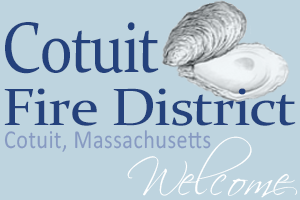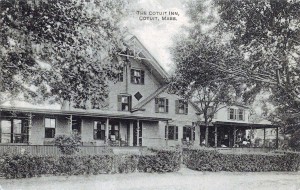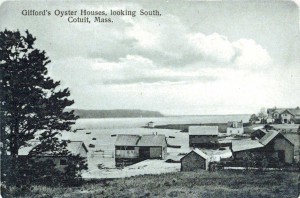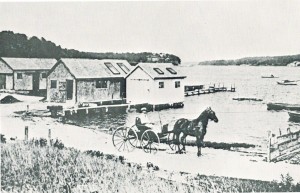1912 to World War II
Courtesy: Historical Society of Santuit and Cotuit
Written by William F. Ebling
The corner of Main and School Streets was always “Downtown Cotuit” but, during the period between Milton Crocker’s entry into the grocery business and the middle ’40’s, a number of stores and enterprises were going strong in other parts of the village. Soon after World War I, Nelson Nickerson operated a summer refreshment stand from a little shack – at Hooper’s Landing where the public launches boats today. Besides renting catboats, Nelson sold oysters, cherrystones, soda pop (“tonic”) and ice cream. A plate of oysters-on the half shell went for twenty cents. The principal customers came from the old Santuit House, owned by Jim Webb. It was located on Main Street on the hill above the Landing. Santuit House burned in September, 1925.
Nearby on Nickerson Lane was the Victor H. Nickerson Co. which developed and manufactured the famous “Victor well point” that was used throughout the Cape and is still used to this present day. The business was carried on by Mr. Nickerson’s son, Freeman, and is now run by his grandson and located on High Street next to the Fire-Department.
Constable Everett Hoxie – he and Seabury Childs constituted the Cotuit police force – ran a grocery and greenhouse at 555 Main Street where the Francis X. Ahearns now live. He sold groceries, kerosene, molasses from a barrel, chewing tobacco, pickle-limes (a nickel apiece), vinegar kegs, clay pipes for blowing bubbles, and hundreds of other items. Further towards Santuit in the “Antiques of Tomorrow” building at 45 Main Street was Elmer Lapham’s emporium for groceries and general goods. Living quarters above the store were occupied by the village cooper, Stephen Richards. He made wooden barrels for the Cotuit Oyster Company, Crosby Oyster Company in Osterville and Sam Cahoon Fish Market in Woods Hole, among others.
At the south end of Cotuit, behind what is now 1151 Main Street, was Ernest Nickerson’s grocery, started at the turn of the century by his father, Alex. In the dark winter months the customers gathered around the cracker barrel and swapped stories. Ernest was a practical joker and his neighbor, Wendell Foster Nickerson, skipper of the schooner Tansy Bitters, was the frequent butt. Ernest, allegedly, devised a mechanical contraption that caused sudden discomfort when Wendell sat down!
Ernest Dottridge ran the weekly movies in Freedom Hall called, for these occasions, The Globe Theater. Nellie Smalley played the piano with vigor, spelled from time to time by Pemberton Whitcomb and others. Constable Seabury Childs attempted to maintain order. Tickets: adults twenty-five cents, children a nickel. And, of course, the house lights were turned up between reel changes. The first evening show started early, at about the hour the mail was sorted at the Post Office. In order to get people seated in time for the first run, it was arranged that Mr. Childs would pick up mail and deliver it at the theater – “Just leave your name at the box office.”
In those days, home delivery service was an integral feature of almost any business. All the grocers regularly stopped by the houses of their customers to pick up orders which were delivered by horse and cart the following day. With the installation of the crank telephone and the flowering of the automobile era there were changes: Herbert Snow delivered for the Cotuit Grocery in a new-fangled Ford truck.
In competition with the resident shopkeepers were the colorful pedlars (sic), plying their wares up and down Main Street. Joe “Wiggles” brought fish on Fridays, house-to-house, scaled, cleaned and filleted right at his truck. “Do you want the head and tail for chowder?” From Osterville came Chris Bolekos, a well-known marathon runner, with fruits and vegetables. During the First World War, there was Mr. Chamberlain, a gentleman from Sandwich, who delivered cream puffs, jelly rolls, cupcakes and bread by horse and covered wagon. Isaac Cohen came from Harwich by train to West Barnstable, by stage to Cotuit, and then walked through the village carrying a pack on his back and a basket covered with oilcloth, containing needles, thread, handkerchiefs and dress goods. Isaac always managed to call on the best cooks of Cotuit around noon – and stayed for lunch.
Of course, in those pre-refrigerator days, the villagers had iceboxes serviced by Horace Nickerson from his truckload of ice cakes, cut on Lewis and Santuit ponds the previous winter. The Wessons, Lowells, Putnams and others had their own private icehouses. The longest truck to make the rounds in Cotuit carried extension ladders and maple rockers with wicker seats for the many summer porches. A favorite with the children was the annual visit of the organ grinder and his monkey, and the occasional hurdy-gurdy.
Baskets? Shoes? Rugs? These, too, were sold doorto-door. The ragman and scrap metal dealer cried out for your disposables. A tinkle of his bell announced the arrival of the knife sharpener, pushing his cart before him. “Sam, the linen man,” was a summer regular, delivering his quality linens and laces from Madeira and other exotic lands. His suitcases and trunks were quickly unpacked, and the contents draped all across the living room until the sale was made.
If you stayed in your house long enough, some pedlar(sic) was almost sure to come along with the very product you were hankering to buy.



